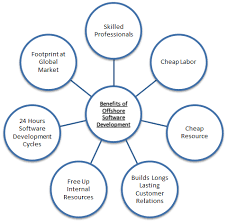Exploring the Evolution of Online Software Development in the Digital Age
The Rise of Online Software Development
In today’s digital age, online software development has become a crucial aspect of creating innovative solutions for businesses and individuals. With the advancement of technology and the widespread use of the internet, the traditional model of software development has evolved to adapt to the demands of a fast-paced and interconnected world.
Benefits of Online Software Development
One of the key benefits of online software development is its accessibility. Developers can collaborate from different locations, allowing for a diverse and global talent pool to work together seamlessly. This not only promotes creativity and innovation but also ensures that projects can be completed efficiently and on time.
Furthermore, online software development offers flexibility in terms of project management. Through various online tools and platforms, teams can easily communicate, share resources, track progress, and make necessary adjustments in real-time. This agile approach enables developers to respond quickly to changing requirements and deliver high-quality software solutions.
Challenges and Solutions
Despite its advantages, online software development also presents challenges such as communication barriers, time zone differences, and security concerns. However, these challenges can be mitigated through effective use of communication tools, establishing clear workflows and processes, implementing robust security measures, and fostering a culture of collaboration and transparency within the team.
The Future of Online Software Development
As technology continues to advance rapidly, online software development is expected to play an even more significant role in shaping the future of software engineering. With emerging trends such as cloud computing, artificial intelligence, and Internet of Things (IoT), developers will need to adapt their skills and practices to stay ahead in this dynamic industry.
In conclusion, online software development offers numerous opportunities for innovation, collaboration, and efficiency in creating cutting-edge software solutions. By embracing this digital transformation and leveraging the power of online tools and technologies, developers can unlock new possibilities and drive meaningful change in the world of software engineering.
Top 7 Advantages of Online Software Development: Enhancing Collaboration, Accessibility, and Efficiency
- Global collaboration with diverse talent pool
- Increased accessibility for developers from different locations
- Efficient project management through online tools and platforms
- Real-time communication and feedback among team members
- Agile approach to respond quickly to changing requirements
- Cost-effective solutions due to reduced need for physical infrastructure
- Enhanced scalability and flexibility in software development projects
7 Challenges of Online Software Development: From Communication Hurdles to Security Risks
- Communication challenges due to remote work
- Potential security risks and data breaches
- Dependency on stable internet connection for collaboration
- Difficulty in establishing team cohesion and camaraderie
- Time zone differences leading to delays in decision-making
- Limited face-to-face interaction impacting creativity and problem-solving
- Risk of misinterpretation or lack of clarity in virtual communication
Global collaboration with diverse talent pool
Online software development enables global collaboration with a diverse talent pool, allowing teams to leverage a wide range of skills and perspectives from around the world. This diversity fosters creativity, innovation, and problem-solving, leading to the development of more robust and dynamic software solutions. By tapping into a global talent pool, teams can access specialized expertise, cultural insights, and fresh ideas that contribute to the success of projects and drive continuous improvement in the field of software development.
Increased accessibility for developers from different locations
The increased accessibility for developers from different locations in online software development has revolutionized the way teams collaborate and innovate. By breaking down geographical barriers, developers can now seamlessly work together regardless of their physical location, tapping into a diverse talent pool and fostering a global perspective. This not only enhances creativity and problem-solving but also promotes a more inclusive and dynamic work environment where expertise from various regions can come together to create impactful software solutions.
Efficient project management through online tools and platforms
Efficient project management through online tools and platforms is a significant advantage of online software development. By leveraging these digital resources, teams can streamline communication, track progress in real-time, allocate tasks effectively, and make timely adjustments as needed. This agile approach not only enhances collaboration among team members regardless of their location but also ensures that projects are completed on schedule and within budget. The use of online tools for project management promotes transparency, accountability, and productivity, ultimately leading to the successful delivery of high-quality software solutions.
Real-time communication and feedback among team members
Real-time communication and feedback among team members is a significant advantage of online software development. By leveraging instant messaging, video conferencing, and collaboration tools, team members can seamlessly exchange ideas, provide timely feedback, and address issues promptly. This fosters a more dynamic and interactive work environment, enhancing collaboration, productivity, and overall project efficiency. The ability to communicate in real-time ensures that team members stay aligned on project goals and can quickly adapt to changes or challenges as they arise, ultimately leading to the successful delivery of high-quality software solutions.
Agile approach to respond quickly to changing requirements
Online software development’s agile approach allows teams to respond promptly to changing requirements, ensuring flexibility and adaptability throughout the project lifecycle. By embracing this methodology, developers can efficiently adjust their strategies, prioritize tasks, and deliver incremental updates based on evolving needs. This proactive and iterative process not only enhances collaboration within the team but also enables stakeholders to provide feedback continuously, resulting in the development of high-quality software that meets dynamic market demands.
Cost-effective solutions due to reduced need for physical infrastructure
Online software development offers cost-effective solutions by significantly reducing the need for physical infrastructure. With the ability to collaborate online, teams can work remotely, eliminating the expenses associated with maintaining a dedicated office space and on-premises hardware. This cost-saving advantage allows businesses to allocate resources more efficiently, invest in innovation, and deliver high-quality software products without being burdened by hefty infrastructure costs.
Enhanced scalability and flexibility in software development projects
Enhanced scalability and flexibility in software development projects are significant advantages of leveraging online platforms. With the ability to easily scale resources up or down based on project requirements, teams can adapt to changing needs efficiently. This scalability ensures that projects can grow seamlessly as needed without being constrained by traditional limitations. Additionally, the flexibility offered by online software development allows for agile responses to evolving project dynamics, enabling teams to adjust priorities, allocate resources effectively, and deliver high-quality solutions in a timely manner.
Communication challenges due to remote work
One significant challenge of online software development is the communication barriers that arise from remote work. With team members working from different locations and time zones, maintaining effective communication can be difficult. Misunderstandings may occur more frequently, leading to delays in project timelines and potential errors in the software development process. It requires extra effort to ensure that all team members are on the same page, which can sometimes hinder the seamless flow of information and collaboration essential for successful software development projects.
Potential security risks and data breaches
One significant drawback of online software development is the potential security risks and data breaches that come with it. Working in a digital environment exposes projects to vulnerabilities that malicious actors can exploit, leading to unauthorized access to sensitive information, data leaks, and other cybersecurity threats. Ensuring the security of online software development requires robust measures such as implementing encryption protocols, regular security audits, and strict access controls to protect valuable data from being compromised. Failure to address these security risks adequately can result in severe consequences for both developers and clients, highlighting the critical importance of prioritizing cybersecurity in online software development practices.
Dependency on stable internet connection for collaboration
One significant drawback of online software development is the heavy reliance on a stable internet connection for effective collaboration among team members. Inconsistent or slow internet connectivity can disrupt communication, delay project progress, and hinder real-time collaboration efforts. This dependency on a stable internet connection poses a challenge for remote teams working across different locations and time zones, as any disruptions in connectivity can lead to inefficiencies and potential setbacks in project timelines. Developers must navigate this con by implementing backup communication channels and strategies to mitigate the impact of unreliable internet connections on collaborative efforts during online software development projects.
Difficulty in establishing team cohesion and camaraderie
One significant challenge of online software development is the difficulty in establishing team cohesion and camaraderie. When team members are geographically dispersed and primarily interact through digital channels, building strong relationships and fostering a sense of unity can be challenging. The lack of face-to-face communication and physical presence can hinder the development of trust, collaboration, and shared understanding among team members. Overcoming this con requires intentional efforts to promote virtual team building activities, encourage open communication, and create opportunities for personal interactions to strengthen bonds and enhance teamwork in the online environment.
Time zone differences leading to delays in decision-making
One significant disadvantage of online software development is the presence of time zone differences, which can often result in delays in decision-making processes. When team members are spread across various locations, coordinating meetings and discussions becomes challenging due to conflicting work hours. This can lead to communication gaps, prolonged response times, and ultimately hinder the efficiency of decision-making within the development team. As a result, project timelines may be extended, impacting overall productivity and potentially delaying the delivery of software solutions.
Limited face-to-face interaction impacting creativity and problem-solving
A significant drawback of online software development is the limited face-to-face interaction among team members, which can have a negative impact on creativity and problem-solving. Without the ability to engage in spontaneous discussions, brainstorming sessions, and in-person collaboration, developers may find it challenging to generate innovative ideas and solutions. The absence of non-verbal cues and personal interactions can hinder effective communication and lead to misunderstandings, potentially slowing down the decision-making process and impeding the team’s ability to tackle complex problems efficiently.
Risk of misinterpretation or lack of clarity in virtual communication
One significant con of online software development is the risk of misinterpretation or lack of clarity in virtual communication. Without face-to-face interactions, nuances in tone, body language, and facial expressions can be lost, leading to misunderstandings among team members. Written messages or emails may be open to interpretation, potentially resulting in confusion regarding project requirements, feedback, or expectations. This lack of direct communication can hinder collaboration and productivity, requiring extra effort to ensure that all stakeholders are on the same page and working towards a common goal.





